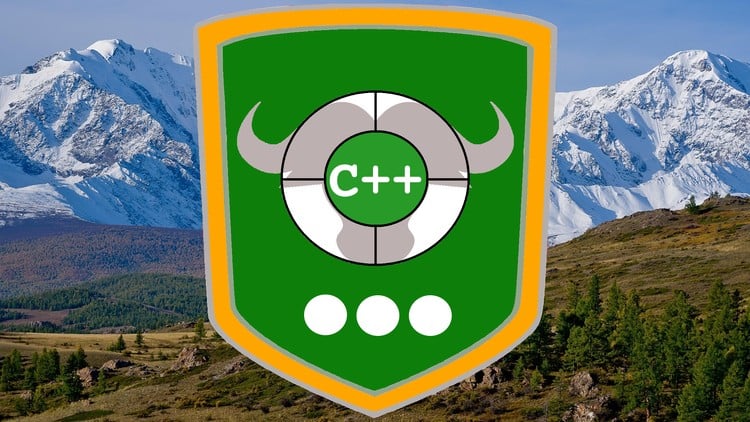
Applied Object Orientation
Why take this course?
🚀 C/C++ 3000: GNU For Advanced Students – Applied Object Orientation 🧠
Welcome to the next level of your C/C++ journey! If you’re already comfortable with the basics of C and functional C++, you’re ready to dive into the world of advanced Object Orientation (OOP). This isn’t just about inheritance; it’s about mastering the tools that enable us to test, encapsulate, and manage our code efficiently.
Course Highlights:
- 🛠 Mastering features for managing multiple projects with ease.
- 🧩 A deep dive into the concepts that make OOP an indispensable part of modern software development.
- 🏗️ Exploring advanced topics such as Object Factory and Framework design in C++98, C++11, C++14, and C++20.
Why Take This Course?
- Comprehensive Review: If you’re new to C/C++, we start with a thorough review of core concepts to ensure you have a solid foundation.
- Advanced Content: For seasoned programmers, get ready for an in-depth exploration of advanced OOP techniques in C/C++.
- Legacy Code Mastery: Learn how to effectively work with and modernize large legacy codebases that continue to power countless systems today.
What You’ll Learn:
- 🤖 Advanced Object Oriented Framework: Understand the intricacies of advanced OOP frameworks and how they can be leveraged in your projects.
- ✨ Object Factory Pattern: Discover how to create sophisticated factories that generate objects without specifying the exact object class.
- 🔍 Code Relationships: Learn about the complex relationships between different pieces of code and how to manage them effectively in C++.
Who Is This Course For?
- 👩💻 Intermediate to advanced C/C++ developers who are ready to take their skills to the next level.
- 🧠 Those who wish to understand how to maintain and modernize legacy codebases with the latest OOP principles in C++.
Your Instructor:
Randall Nagy, a seasoned programmer with decades of experience writing in C/C++, will guide you through this course. His hands-on approach and real-world insights make him the perfect instructor for this advanced level course.
Bottom Line:
Understanding legacy code is crucial for any software developer. Whether you’re working on new projects or updating classic systems, having a grasp of these powerful OOP concepts will set you apart. Join us in this journey to unlock the full potential of C/C++ with GNU! 👩💻✨
Enroll now and take your C/C++ skills to the pinnacle of expertise with “C/C++ 3000: GNU For Advanced Students”! 🚀🌟
- GNU Ecosystem Mastery: Deeply explore the powerful GNU development ecosystem, understanding its intricate synergy with advanced C/C++ for building sophisticated, high-performance applications beyond basic syntax.
- GCC/G++ Advanced Optimizations: Master the GNU Compiler Collection (GCC/G++), delving into intricate optimization flags, custom compilation strategies, and diverse target architectures for fine-tuned performance and embedded development.
- GDB for System Debugging: Unravel the GNU Debugger (GDB), employing advanced techniques like reverse debugging, conditional breakpoints, and scripting for complex, multi-threaded, and low-level system applications effectively.
- Robust GNU Build Systems: Demystify GNU Make and advanced build systems, constructing robust, portable, and efficient project pipelines, including critical integration with Autotools or CMake for large-scale, maintainable projects.
- Advanced C++ OO & Templates: Explore advanced C++ object-oriented paradigms, including template metaprogramming, policy-based design, and sophisticated inheritance, understanding their performance and maintainability within the GNU environment.
- System-Level Programming & Binutils: Gain proficiency in system-level programming using glibc and POSIX APIs, alongside investigating GNU Binutils (linker, assembler) for deep insights into object file formats, shared libraries, and memory management.
- Performance Tuning & Profiling: Apply advanced profiling and performance optimization techniques using GNU tools like Gprof and Valgrind, meticulously identifying bottlenecks and optimizing C/C++ code for maximum efficiency across diverse platforms.
- Concurrency & Parallelism: Master concurrent and parallel programming with C++ using <thread>, <future>, OpenMP, or MPI, effectively leveraging multi-core architectures for scalable, high-performance solutions within the GNU framework.
- Cross-Compilation & Compiler Internals: Delve into the nuances of cross-compilation for various CPU architectures and embedded targets, and examine compiler internals to understand how C/C++ code translates into optimized machine instructions.
- PROS: Deep Expertise: Attain a truly advanced command of C/C++ and the GNU toolchain, critical for system-level and high-performance development.
- PROS: Industry Readiness: Acquire highly sought-after skills in performance optimization, complex debugging, and large-scale project management.
- PROS: Holistic Mastery: Develop comprehensive command of the GNU ecosystem, enabling confident development of intricate, optimized software.
- CONS: High Barrier: This course requires a very strong prior C/C++ foundation and significant dedication, potentially challenging without adequate preparation.